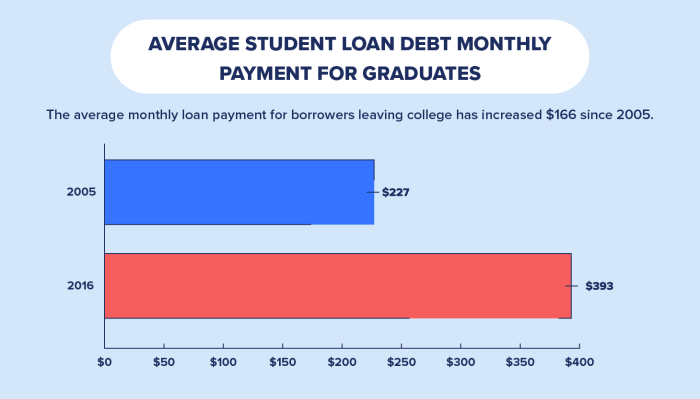
Navigating the complexities of student loan repayment after graduation can feel overwhelming. Understanding deferment options is crucial for recent graduates facing financial uncertainty or seeking to prioritize other life goals. This guide explores the various deferment periods available, the eligibility criteria, and the long-term financial implications of delaying loan payments. We’ll clarify the differences between deferment and forbearance, providing you with the knowledge to make informed decisions about your student loan debt.
This exploration will cover the typical lengths of deferment, factors that can influence these periods, and the potential impact on your overall loan repayment. We will also examine the effect of interest accrual during deferment and offer strategies for effective debt management, even when utilizing this option. Ultimately, the goal is to equip you with the tools to manage your student loans responsibly and strategically.
Understanding Deferment Options

After graduation, the transition into repayment can be challenging. Understanding your options for deferring student loan payments is crucial to managing your finances effectively during this period. Deferment allows you to temporarily postpone your loan payments, but it’s important to note that interest may still accrue during the deferment period, depending on the type of loan and deferment option chosen.
Types of Student Loan Deferments
Several types of deferments are available to borrowers after graduation, each with its own eligibility criteria and implications. Choosing the right deferment requires careful consideration of your individual circumstances and financial goals.
Economic Hardship Deferment
This deferment is available to borrowers experiencing temporary economic hardship, such as unemployment or reduced income. Eligibility typically requires documentation demonstrating a significant reduction in income or unexpected financial difficulties. The length of the deferment period can vary depending on the lender and the severity of the hardship. It’s important to contact your loan servicer to determine your eligibility and the specific terms of your deferment.
In-School Deferment
While primarily associated with students currently enrolled, some loan programs might offer a limited extension of in-school deferment for a short period post-graduation, particularly if pursuing further education immediately. This is usually limited to a specific timeframe and requires enrollment verification.
Unemployment Deferment
This deferment is designed for borrowers who have become unemployed and are actively seeking employment. Proof of unemployment, such as a confirmation from the unemployment office or a job search log, is usually required. The duration of this deferment is generally limited, and it’s crucial to maintain active job searching throughout the deferment period.
Total and Permanent Disability Deferment
For borrowers with a total and permanent disability, this deferment offers long-term relief from loan payments. This requires documentation from a physician or other qualified medical professional confirming the disability. The requirements for this type of deferment are generally more stringent due to its permanent nature.
Comparison of Deferment Options
| Deferment Type | Eligibility Criteria | Length | Interest Accrual |
|---|---|---|---|
| Economic Hardship | Documented financial hardship (unemployment, reduced income) | Varies, lender-dependent | Usually accrues |
| In-School (Post-Graduation Extension – if applicable) | Enrollment in eligible educational program (limited post-grad extension) | Limited time period (check with lender) | Usually accrues |
| Unemployment | Proof of unemployment and active job search | Limited time period | Usually accrues |
| Total and Permanent Disability | Documentation of total and permanent disability | Indefinite | May or may not accrue depending on the loan program |
Impact of Deferment on Loan Repayment
Deferring student loan payments offers temporary relief, but it’s crucial to understand the long-term financial implications. While pausing payments provides short-term breathing room, it doesn’t eliminate the debt; instead, it significantly impacts the total repayment amount due to the accrual of interest.
Deferment affects the total amount owed by increasing the principal balance. During a deferment period, interest continues to accumulate on the loan’s outstanding balance. This accumulated interest is then added to the principal, increasing the total amount you ultimately owe. The longer the deferment period, the more interest accrues, leading to a substantially larger final repayment amount.
Interest Accrual During Deferment
Understanding how interest accrues during deferment is key to managing your student loan debt effectively. The interest rate on your loan determines the amount of interest added each month. This interest is calculated on the outstanding principal balance, even while payments are paused. Let’s illustrate with examples:
Scenario 1: A student has a $10,000 loan with a 5% annual interest rate. If they defer their loan for one year, the interest accrued would be $500 ($10,000 x 0.05). This $500 is added to the principal, resulting in a new principal balance of $10,500 at the end of the deferment period.
Scenario 2: Consider the same $10,000 loan with a 7% annual interest rate deferred for two years. In the first year, $700 in interest would accrue, bringing the principal to $10,700. In the second year, interest would be calculated on this increased principal, resulting in even more interest accrued (approximately $749, assuming simple interest calculation). The total interest accrued over two years would be approximately $1449, increasing the principal to $11,449.
Comparison of Immediate Repayment vs. Repayment After Deferment
The following table compares the total cost of a loan repaid immediately versus one repaid after a deferment period, highlighting the significant impact of interest accrual. These figures assume simple interest calculations for simplicity; real-world scenarios may involve slightly different calculations based on loan terms and compounding frequency.
| Scenario | Loan Amount | Interest Rate | Deferment Period | Total Interest Accrued | Total Repayment Amount |
|---|---|---|---|---|---|
| Immediate Repayment | $10,000 | 5% | 0 years | $0 (assuming immediate repayment) | $10,000 |
| Repayment After Deferment | $10,000 | 5% | 1 year | $500 | $10,500 |
| Repayment After Deferment | $10,000 | 7% | 2 years | ~$1449 | ~$11,449 |
Forbearance vs. Deferment
Understanding the differences between deferment and forbearance is crucial for effectively managing your student loans. Both options temporarily postpone your loan payments, but they differ significantly in their implications and eligibility requirements. Choosing the right option depends on your specific circumstances and financial situation. This section will clarify the key distinctions between these two strategies.
Forbearance and deferment are both ways to temporarily stop or reduce your student loan payments, offering relief during financial hardship. However, they differ significantly in their terms and conditions. Deferment is generally preferred as it often doesn’t accrue interest on subsidized loans, while forbearance typically does.
Key Differences Between Deferment and Forbearance
The most significant difference lies in the reasons for granting each option and the impact on interest accrual. Deferment is usually granted for specific reasons Artikeld by the federal government, such as unemployment or enrollment in school. Forbearance, on the other hand, is often granted for more general financial hardship, and the lender has more discretion in approving the request. Understanding these differences is vital in making an informed decision.
| Feature | Deferment | Forbearance |
|---|---|---|
| Reason for Granting | Specific qualifying events (e.g., unemployment, graduate school enrollment) | General financial hardship, lender discretion |
| Interest Accrual (Subsidized Loans) | Usually does not accrue interest (for subsidized loans) | Usually accrues interest |
| Interest Accrual (Unsubsidized Loans) | Always accrues interest | Always accrues interest |
| Impact on Credit Score | Generally less negative impact | Potentially more negative impact due to missed payments |
| Length of Period | Limited periods, often tied to qualifying events | More flexible periods, but potentially longer |
| Eligibility Requirements | Stricter eligibility criteria | Generally less stringent criteria |
Situations Favoring Forbearance
Forbearance might be a more suitable option than deferment when you face temporary financial difficulties that don’t neatly fit into the specific categories for deferment. For example, if you experience an unexpected medical expense or a temporary job loss not meeting the criteria for unemployment deferment, forbearance could provide needed short-term relief. It’s important to note that while forbearance offers flexibility, it’s crucial to understand the implications of accruing interest. Careful consideration of the long-term cost is vital.
Navigating the Application Process

Applying for a student loan deferment can seem daunting, but with a clear understanding of the process and necessary documentation, it becomes significantly more manageable. This section provides a step-by-step guide, outlining the required paperwork and addressing potential hurdles. Remember that specific requirements may vary depending on your loan servicer and the type of deferment you are seeking.
The application process typically involves several key steps, each requiring careful attention to detail. Failure to provide complete and accurate information can lead to delays or rejection of your application.
Application Steps
The application process generally begins with contacting your loan servicer. This is the company responsible for managing your student loans. Their contact information should be readily available on your loan documents or online through the National Student Loan Data System (NSLDS). Once you’ve located your servicer, you can typically access the deferment application through their website. This usually involves filling out an online form, providing supporting documentation, and submitting the completed application. Some servicers may still offer paper applications, but online applications are becoming increasingly common. After submission, you will receive confirmation and an estimated processing time. You should monitor your application’s status through your online account.
Required Documentation
Gathering the necessary documentation is crucial for a smooth and efficient application process. Incomplete applications often lead to delays. Commonly required documents include proof of employment (if applying for an unemployment deferment), documentation verifying enrollment in a qualifying program (for in-school deferment), or medical documentation (for deferment due to disability or illness). Specific requirements vary depending on the reason for deferment. Always check with your loan servicer to confirm the exact documents needed for your specific circumstances. For example, an unemployment deferment might require a recent pay stub showing zero income and a letter from your employer confirming your unemployment status. A deferment based on medical reasons might require a physician’s statement detailing the condition and its impact on your ability to repay your loans.
Potential Challenges and Solutions
Several challenges can arise during the deferment application process. One common issue is providing incomplete or inaccurate information. Carefully review all forms and ensure that all information is correct and complete before submitting your application. Another challenge is delays in processing. Be patient and allow sufficient processing time. If you haven’t heard back within the estimated timeframe, contact your loan servicer to inquire about the status of your application. A final challenge can be the rejection of your application. If this occurs, review the reason for rejection and reapply if possible, ensuring you address any deficiencies identified in the initial application. For instance, a missing document or an incorrectly filled form could lead to rejection. Addressing these issues in a resubmission often resolves the problem. If you disagree with the rejection, you may have grounds to appeal the decision, depending on the specific circumstances and your loan servicer’s policies.
Long-Term Financial Implications
Deferring student loan payments might seem like a temporary solution to immediate financial hardship, but it carries significant long-term financial consequences that can impact your overall financial well-being for years to come. Understanding these implications is crucial for making informed decisions about your student loan repayment strategy. The longer you defer, the more interest accrues, leading to a larger overall debt burden. This can delay major life goals like homeownership, starting a family, or investing for retirement.
Deferment extends the repayment period, meaning you’ll pay more in interest over the life of the loan. This increased interest significantly increases the total cost of your education. For example, deferring a $50,000 loan for five years at a 6% interest rate could add thousands of dollars to the total amount you ultimately repay. This added cost reduces your financial flexibility and can limit your ability to save and invest for the future.
Impact of Deferment on Credit Score
Deferring student loan payments can negatively affect your credit score, though the impact varies depending on the length of deferment and your overall credit history. Lenders view deferment as a sign of potential financial instability, as it indicates that you’re unable to meet your current financial obligations. A lower credit score can lead to higher interest rates on future loans (mortgages, auto loans, credit cards), making it more expensive to borrow money for significant life purchases.
Consider this hypothetical example: Sarah and John both graduated with $40,000 in student loan debt. Sarah diligently made her monthly payments, maintaining a good credit score of 750. John, facing financial challenges, deferred his loans for three years. While his loan balance increased due to accrued interest, the deferment also negatively impacted his credit score, dropping it to 650. When Sarah and John applied for a mortgage five years later, Sarah qualified for a lower interest rate (3.5%), resulting in significant savings over the life of the loan. John, however, faced a higher interest rate (5%), increasing his monthly mortgage payments and the overall cost of his home. This illustrates how even a temporary deferment can have lasting financial ramifications.
Strategies for Effective Debt Management During Deferment
Even with a deferment, proactive debt management is crucial. Creating a realistic budget that prioritizes loan repayment, even if it’s a smaller amount than the regular payment, is essential. Exploring options like income-driven repayment plans can help make payments more manageable. These plans adjust your monthly payment based on your income and family size, potentially lowering your monthly burden. Furthermore, actively seeking ways to increase income, whether through a side hustle or a higher-paying job, can significantly accelerate debt reduction even during a deferment period. Consistent communication with your loan servicer is also vital to ensure you’re aware of your options and to avoid any potential issues. Finally, considering debt consolidation could potentially simplify your repayment process and potentially lower your interest rate.
Conclusion

Successfully navigating the post-graduation student loan landscape requires a clear understanding of available options and their potential consequences. While deferment can offer temporary relief, it’s essential to weigh the short-term benefits against the long-term financial implications, including interest accrual and its effect on the total amount owed. By carefully considering your circumstances and utilizing the information provided, you can make informed decisions that support your financial well-being and long-term goals.
FAQ Corner
What happens to my interest during a deferment?
Interest typically continues to accrue on most federal student loans during a deferment, increasing the total amount you owe. However, some deferment types may offer temporary interest subsidies.
Can I defer my student loans indefinitely?
No, deferments are typically granted for a specific period, often related to the qualifying circumstance. Extensions may be possible in some situations, but they are not guaranteed.
What if I can’t afford my student loan payments even after deferment?
Consider exploring options like income-driven repayment plans or contacting your loan servicer to discuss alternative repayment strategies to avoid default.
How does a deferment impact my credit score?
While a deferment itself doesn’t directly damage your credit score, consistently missed payments after the deferment period ends can negatively impact your credit.
